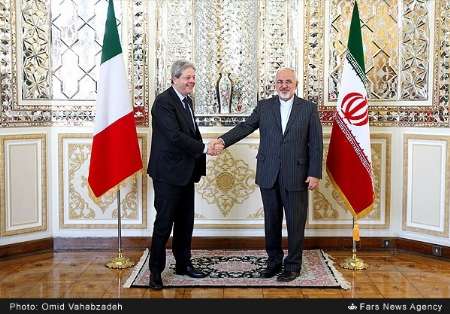ID :
359333
Fri, 03/06/2015 - 17:41
Auther :
Shortlink :
https://oananews.org//node/359333
The shortlink copeid
Iran can be Italy’s powerful ally in fighting terrorism

Tehran, March 5, IRNA -- Relations between Iran and Italy have been always good, without tension and based on mutual respect, which is one of a kind in comparison to Iran's ties with other major European countries.
Therefore, despite certain differences between the two countries, diplomatic exchanges as well as dialogue and bilateral and multilateral consultations and cooperation with regard to regional and global issues was in place between the two countries, at least up to 2006. However, subsequent resolutions adopted against Iran by the United Nations Security Council and some other factors suddenly brought about changes in those relations and the tradition of bilateral exchanges. Under former Italian prime minister, Silvio Berlusconi, whose second term in office lasted from 2001 to 2005, relations between the two countries grew qualitatively and quantitatively in all their aspects. Also, during his tenure, Italy became Iran's first trade partner among European countries, for the first time, and the volume of trade and economic exchanges between the two countries increased to about €7 billion.
As Italy started to follow suit with the Security Council’s sanctions against Iran, the volume of trade between the two countries dropped to €3.6 billion euro from 2005 to 2006 and subsequently slumped to €1.2 billion in 2013. The figure for trade volume between the two countries in 2014 has been similar to 2013. However, a review of Iran-Italy relations shows that it is not difficult for the two countries to go back to their golden times, and if necessary grounds are provided and through mutual understanding between Tehran and Rome, they are able to help their cooperation grow in a spurt. This is especially true as Rome is well aware that a unilateral policy will not be beneficial to its interests under the existing global conditions. At present, Iran is one of the most important and most stable countries in the Middle East. In the meantime, extremism has been on the rise and emerging terrorist groups have been unfortunately able to recruit from European citizens. Such developments in addition to recent terrorist activities in Europe have spread a wave of concern and a general feeling of insecurity in European countries and have posed great threats to Italy as well.
The ISIS terrorist group is fortifying its bunkers in Libya and in the latest video the group released online, they openly announced that they are “south of Rome,” and will soon conquer Rome as well. Undoubtedly, neither Rome is so defenseless, nor the ISIS is so powerful. However, it is a reality that the ISIS is now present in a fragmented Libya and this North African country is just 200 miles from southern coasts of Italy. At the same time, immigrants have been flooding toward Italy from Libya. The Italian Foreign Minister Paolo Gentiloni announced a few days ago that illegal immigration continues into his country and a total of 7,882 people have landed on the Italian soil by crossing the Mediterranean Sea since the beginning of 2015. This figure stands in sharp contrast to last year’s figure, which stood at 4,548. Therefore, judging on the basis of the geographical positions of Libya and Italy, it follows that Rome cannot remain indifferent toward its national security and verbal threat of the ISIS, which is purportedly planning to conquer Rome in the near future, regardless of how empty and ridiculous that threat may seem.
In an interview with the Italian newspaper, Il Messaggero, the Italian foreign minister said his country’s intelligence and security services are totally active to head off all kinds of threats. In another part of the same interview he noted that the ISIS terrorists talk about Crusades and hoisting their black flags over the Vatican and Rome, as the archenemies of Islam, emphasizing that “we will fight against the ISIS terrorism.” Considering the ISIS’ threat and Italian foreign minister’s remarks, it seems that a covert war has already started and Libya is regaining its past importance for Roman politicians. However, this time, no economic, trade or oil and gas deal is the focus of attention. All the talks are about the beginning of a war which aims to secure the borders of Italy and to protect the integrity of the Vatican in the face of possible infiltration and assaults by the ISIS terrorists. It shows that Italy should take very seriously the ominous and dangerous phenomenon of extremism and terrorism. Of course, in its fight against chaos, instability, violence and terrorism, Italy is not totally alone in the face of these dark clouds, and with the help of its allies, it will be able to push them aside and emerge victorious. All they have to do is to look around them and find suitable allies.
(By Bahram Ghasemi, Iran's Former Ambassador to Italy)
(Source: Ettelaat Newspaper http://www.ettelaat.com/ Translated By Iran Review)





